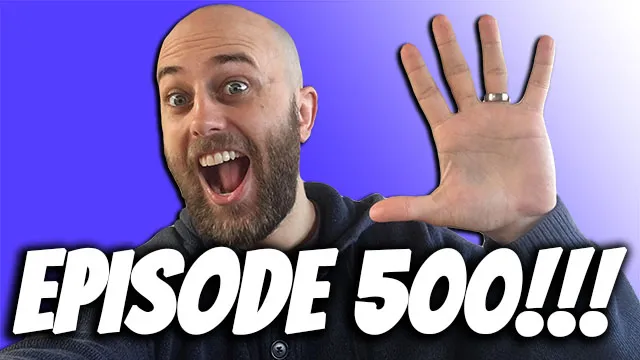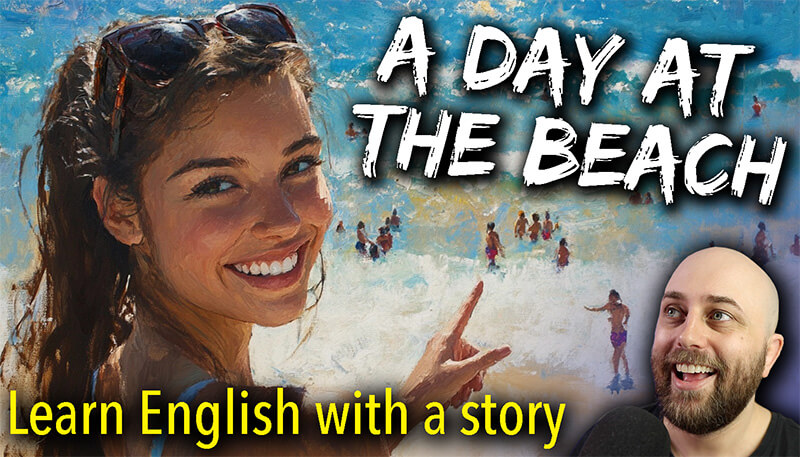AE 473 – How to Use English Articles: A, AN, & THE
Learn Australian English in this episode of the Aussie English Podcast where I teach you how to use English articles: A, AN, & THE!
AE 473 – How to Use English Articles: A, AN, & THE
G’day, guys. Welcome to this episode of Aussie English. Today, I’m going to be answering a question from one of my students, Aykhan. Let’s have a look.
G’day, Pete. My name is Aykhan, and I’m Baku, Azerbaijan. I have trouble with articles. Could you make it to explaining how to use them? See ya!
Alright, great question Aykhan. Hopefully, this video will do it justice and simplify using articles. Let’s check it out.
Alright, guys, so what is an article? No, it’s not one of those. It is an adjective in English. ‘A’ or ‘an’, and ‘the’, they’re actually adjectives, because they modify nouns.
So, we have ‘the’, which is the definite article, and this one refers to specific or particular nouns. And then we have ‘A’ or ‘an’, which are the indefinite articles and these refer to non-specific or non-particular nouns.
Let’s look at an example.
If I say, “Let’s read the book”, I’m referring to a specific book, this book, that book. You know this book. So, I want to read the book. Okay?
Whereas, if I say “I want to read a book”, it could be any book. I’ve got dozens of books, hundreds of books in the world, I just feel like reading a book. It doesn’t matter which one. It is non-specific. Whereas, if I say “the book”, it’s the specific book on the ground over here.
Here’s another way to think about this. ‘The’ can be used to refer to a specific member of a group. “My friend James is the tallest person I know.”. James is the specific person, the particular person, out of the group of people, all people that I know, James is the specific person who is tallest.
Whereas ‘a’ or ‘an’ can be used to refer to any member of a group. So, for instance, “My friend James is a tall person”, he’s a tall person. I know many tall people. Out of the group of tall people that I know James is just one of those people. He is a tall person. Non-specific, non-particular. He is just one of many.
So, if we use ‘a’ or ‘an’ this is modifying the noun, it’s an adjective modifying the noun, to refer to any, a non-specific a non-particular member of a group. ‘A’. So, I want a pen or pencil. It doesn’t matter which one. I don’t care. I just need a pencil. I need a pen.
So, let’s go through some examples.
“My son wants a bike for Christmas”. “My son wants a bike for Christmas.”. He doesn’t want any specific bike, he doesn’t want any particular bike, he just wants a bike. It doesn’t matter which one. Any bike will do. We don’t know which bike, because we haven’t found a bike yet. “My son wants a bike for Christmas”.
“I need to see a doctor”. “I need to see a doctor”. I don’t care which doctor. It could be any doctor, but I need a doctor. One of the many doctors in the group that are hopefully at the hospital. “I need to see a doctor”.
“When I was at the beach I saw a dolphin.”, you know? I saw a dolphin. I saw a single non-specific thing, in this case, a dolphin. I saw a single dolphin. There were probably many dolphins, but right now, I’m just talking about the one that I saw. “I saw a dolphin”.
Note: If you want to refer to plural things, as in maybe “dolphins”, “bikes”, “doctors”, you need to use the word ‘some’.
“My son wants some bikes for Christmas”.
“I need some doctors.”.
“I saw and dolphins”.
Rules for using ‘a’ and ‘an’. If the word following the indefinite article ‘a’ or ‘an’ begins with a consonant sound, it needs to be ‘a’: a bike, a girl, a boring event, a European. It needs to be ‘a’ followed by a consonant sound.
If the following word begins with a vowel sound, it needs to be ‘an’. There needs to be an ‘N’ at the end of the indefinite article. ‘An’. An apple, an empty house, an ICU doctor, an hour.
In some rare cases, words beginning with an ‘H’ that is pronounced will take ‘an’ in front of them. And the only example I can think of is “An historic event”, but I wouldn’t worry too much about those.
Alright, time for the definite article, ‘the’. Time the definite article.
So, ‘the’ is the definite article and it modifies the noun to be specific or the particular member of a group that we’re referring to.
So, let’s go through the previous examples we used with ‘a’ and ‘an’, and have a look at how they would change if we want to use ‘the’.
“My son wants the bike he worried at the store yesterday for Christmas.”. He doesn’t want just any bike. He wants that bike, that specific bike, the bike he rode at this store yesterday. We know which bike he wants.
“I need to see the doctor who treated me this morning.”. I need to see the specific doctor, the doctor who treated me this morning. I don’t want to see just any doctor. I want to see this specific doctor who saw me this morning.
“When I was at the beach I saw the dolphin with just one fin.”. So, we’re not talking about any dolphin. We’re talking about that specific dolphin, the dolphin that just has one fin.
Alright, now let’s talk about countable and uncountable nouns. ‘A’ and ‘an’ have to be used with countable nouns, because you have units. Whereas uncountable nouns, you don’t have a single unit so you can’t use ‘a’ or ‘an’.
“I need a new car.”. “I need a new car.”.
“I want to talk to a friend.”. “I want to talk to a friend.”.
‘The’ can be used with uncountable nouns.
“I love eating the food.”. The specific food. “The food at this restaurant, I love eating the food here.”. You know that I’m talking about specific food. “I love eating the food here.”. If I say, “I just love eating food”, “I love eating food”, it’s non-specific. I love eating food. It’s true.
“I spilt the wine on the rug.”. “The” shows that I’m talking about specific wine, the wine I bought yesterday, the wine I was drinking. “I spilt wine on the rug.”. Whereas, if I just say, “I spilt wine on the rug”, it’s any wine. It doesn’t matter, that’s not important, which one it was. It was just that I spilt wine on the rug.
Using ‘the’ geographically.
This is where things get a little bit more specific with the definite article. We need to use ‘the’ before things like names of rivers, names of oceans, names of seas: the Nile, the Pacific Ocean.
We need to use ‘the’ before points on the globe: The North Pole, The Equator.
Before geographical areas: The Middle East, The West.
Before deserts, forests, peninsulas, and gulfs: The Sahara, The Persian Gulf, The Black Forest.
We don’t use ‘the’ before the names of most countries or territories: Mexico, Australia, Bolivia. However: the Netherlands, the Philippines.
Before names of cities, towns, or states: Melbourne, Seoul, California.
Before the names of streets: Washington Boulevard, Collins Street.
Before the name of lakes and bays: Port Phillip Bay, Lake Eyre.
Before the names of mountains: Mount Everest, Mount Kosciuszko.
Before the names of continents: Asia, Europe, Antarctica.
Before the names of islands: Easter Island, Phillip Island.
Obviously, there are always exceptions, but just have to learn those unfortunately.
To finish up, guys, let’s talk about the omission of articles.
Here are some common types of nouns that don’t take articles.
The names of languages or nationalities, unless you’re specifically referring to the population: Chinese, English, Spanish, Russian. If I say “the Chinese”, “the English”, “the Spanish”, I’m referring to the population.
Names of sports: volleyball, soccer, footy.
The names of academic subjects: maths, biology, physics, English.
Alright, guys, so that is it for today’s episode. I hope it helps. Just remember, with regards to articles, that ‘a’ or ‘an’ is referring to any member of a group. “I need a pen”. I don’t care which pen. I just need a pen this pen will do.
Whereas, ‘the’ refers to a specific member of a group. “I need the pen that’s purple”. I need that purple pen. Here it is. This is the purple one, the purple pen that I need.
Anyway, guys, go over it a few times and let me know if you have any other questions that you would like me to do videos in in the comments below. Hit the subscribe if you want to stay up to date with all new videos coming out, and I’ll see you in the next episode. Great to see you, guys. Peace!
Watch More Aussie English Videos Here!
Here's what you get when you sign up!
- Read while you listen using the Premium Podcast player.
- Understand every word in every episode.
- Download all PDF transcripts and MP3s for 600+ episodes.
- Get access to bonus member-only episodes.












Responses